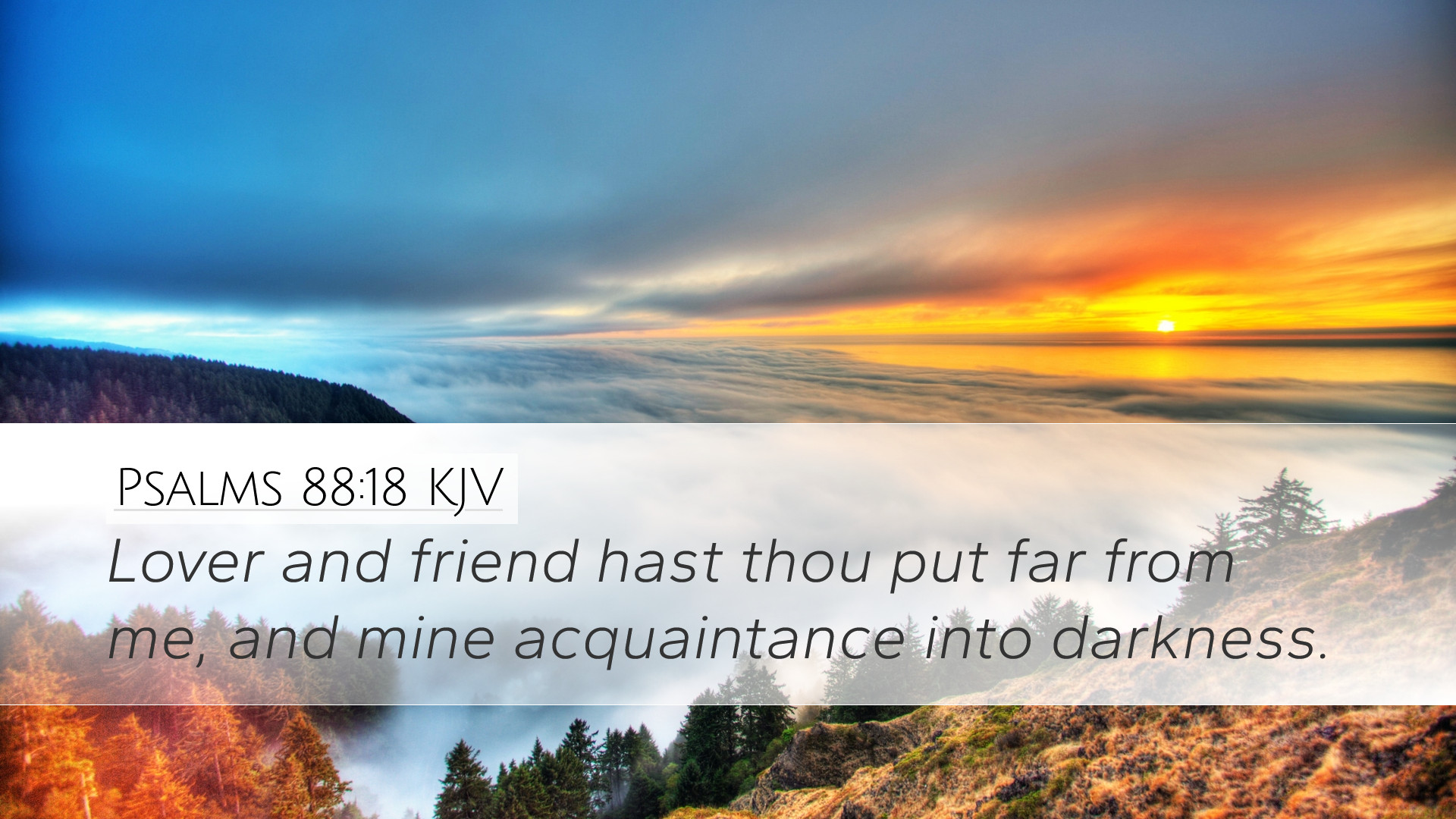Psalms 88:18 - A Commentary
Bible Verse: "Loved one and friend hast thou put far from me, and mine acquaintance into darkness." - Psalms 88:18
Overview
This profound verse from Psalm 88 epitomizes the deep sense of abandonment and despair experienced by the psalmist. Throughout this commentary, we shall explore the implications of this verse as interpreted by renowned theologians such as Matthew Henry, Albert Barnes, and Adam Clarke.
Context of Psalm 88
The psalm is categorized as a lament, primarily reflecting on suffering and isolation. As one of the few psalms that does not include a statement of hope or praise, it underscores the raw emotion of anguish before God. This opens avenues for various theological discussions on the nature of suffering and divine silence.
Thoughts from Matthew Henry
Matthew Henry expresses how Psalm 88 serves as a stark reminder of the human condition amid suffering. He notes:
- The Darkness of Despair: The phrase "put far from me" suggests an acute awareness of being distanced from loved ones. Henry sees this as an illustration of the painful separation felt in distressing times.
- Human Relationships: The psalmist mourns not just the physical absence of friends but the emotional support they provide. In times of deep anguish, the absence of loved ones is magnified, accentuating loneliness.
- The Sovereignty of God: Although there is a sense of abandonment, Henry highlights God’s sovereignty throughout, as the psalmist still addresses God, even in distress. This act of turning to God amid darkness showcases faith amidst trials.
Insights from Albert Barnes
Albert Barnes offers a theological lens to interpret this verse. His commentary dives into the spiritual dimensions of suffering:
- Divine Discipline: Barnes suggests that such desolation might be a form of divine discipline. The separation from friends is a call to deeper reflection and reliance on God’s favor rather than human relationships.
- Isolation and Connection with God: He posits that while the psalmist feels isolated, this might lead to a more profound connection with God as one finds solace in the divine presence, despite physical absence.
- Hope in Despair: Despite the overwhelming darkness conveyed, Barnes does not overlook the possibility that acknowledging despair can lead to hope. This realization challenges believers to confront their feelings before God.
Reflections from Adam Clarke
Adam Clarke provides a rich context through language and historical perspective regarding Psalm 88:18:
- Literary Analysis: Clarke notes the use of "loved one and friend," which encapsulates the deep bonds of affection. His analysis suggests that such a loss is not merely physical but deeply emotional and psychological.
- Contextual Implications: The mention of acquaintances being put into darkness resonates with life's unpredictability. Clarke interprets this as a reflection of societal relationships where loyalty may wane during trials.
- A Cry for Divine Recognition: Clarke emphasizes the need for recognition from God in moments of solitude. The psalmist's lamentation is an urgent plea for God’s intervention amidst overwhelming grief.
Theological Themes
Multiple theological themes surface from Psalms 88:18 that are pivotal in pastoral care, theological studies, and academic discourse:
- The Nature of Suffering: The psalm invites scholars and theologians to engage with the question of why suffering exists and how it affects human relationships.
- Community and Isolation: The impact of community on individual well-being during hardships is a significant exploration point for pastors and congregation leaders.
- God’s Presence in Darkness: The challenge for believers to sense God’s presence even when circumstances feel dark presents a crucial aspect of faith development.
Application for Pastoral Ministry
This psalm presents a rich resource for pastoral care:
- Utilizing the themes of lament, pastors can create spaces for congregants to express their feelings of abandonment and grief.
- Facilitating dialogues on mental health through the lens of spiritual struggles as illustrated in this verse.
- Emphasizing the importance of community support during times of personal crisis, nurturing relationships that can withstand the challenges of life.
Conclusion
Psalms 88:18 transcends time, offering insights that resonate deeply within the human experience. By reflecting on the interpretations of Henry, Barnes, and Clarke, one finds a compelling narrative of despair crafted with theological depth, encouraging deeper examination of our relationships with both God and each other. This psalm stands as a monument to the reality of pain and the ongoing journey toward understanding God’s heart in our suffering.


